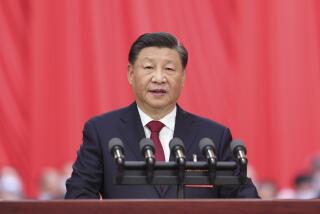An Unworkable Purge
- Share via
The hard-liners who are now riding high in China have reaffirmed their narrow vision of an ideal future. The economic reforms launched a decade ago to rescue China’s economy from stagnation are to continue. So is the policy of “openness” in diplomatic and commercial contacts with the West. But no tolerance whatsoever will be extended to “bourgeois liberalization,” i.e., demands for greater human and political rights. China’s rulers, in other words, have again made it plain that they don’t intend to see the Communist Party’s monopoly on power diluted. Those who stand at the pinnacle of that power will alone decide what is best for the people. Anyone who dares to challenge that claimed authority can expect to be crushed.
All this clearly reflects the implacable views of paramount leader Deng Xiaoping and other doddering survivors of the Long March of the mid-1930s. These are men convinced beyond any doubt that by personal suffering and long experience they have earned the right to govern absolutely, and they will not have that right questioned, least of all by young people who have never known a China that wasn’t Communist. It reflects as well the self-interests of that 4% of the population whose membership in the party gives them precedence over 1.1 billion fellow Chinese. Party cadres know what humiliations have recently been inflicted on Communist officials in the Soviet Union and Poland who have been forced, as their countries desperately seek economic improvement, to submit themselves to tests of popular approval. It is not just the party as an institution that these cadres are committed to defend; it is the party as the provider of their own elite status as well.
But the party’s plans for the future contain an inescapable contradiction, to use a favorite word of Marxists. China, as its leaders recognize, can’t hope to modernize and prosper unless it is able to go on learning advanced skills and obtaining technology from the West. But the very need to maintain that “openness” means that an increasing number of Chinese students, scholars, technocrats and officials must go on being exposed to those same ideas about human rights, intellectual freedom and popular participation in government that the party so fears and so vehemently denounces.
The infection of bourgeois liberalization is likely to be constantly recontracted as exposure to the West continues, and attempts to limit its spread by repeated crackdowns and purges must inevitably prove self-destructive. The party has produced what its leaders regard as a congenial vision of the future. Its obvious flaw is that it can’t work.
More to Read
Sign up for Essential California
The most important California stories and recommendations in your inbox every morning.
You may occasionally receive promotional content from the Los Angeles Times.












